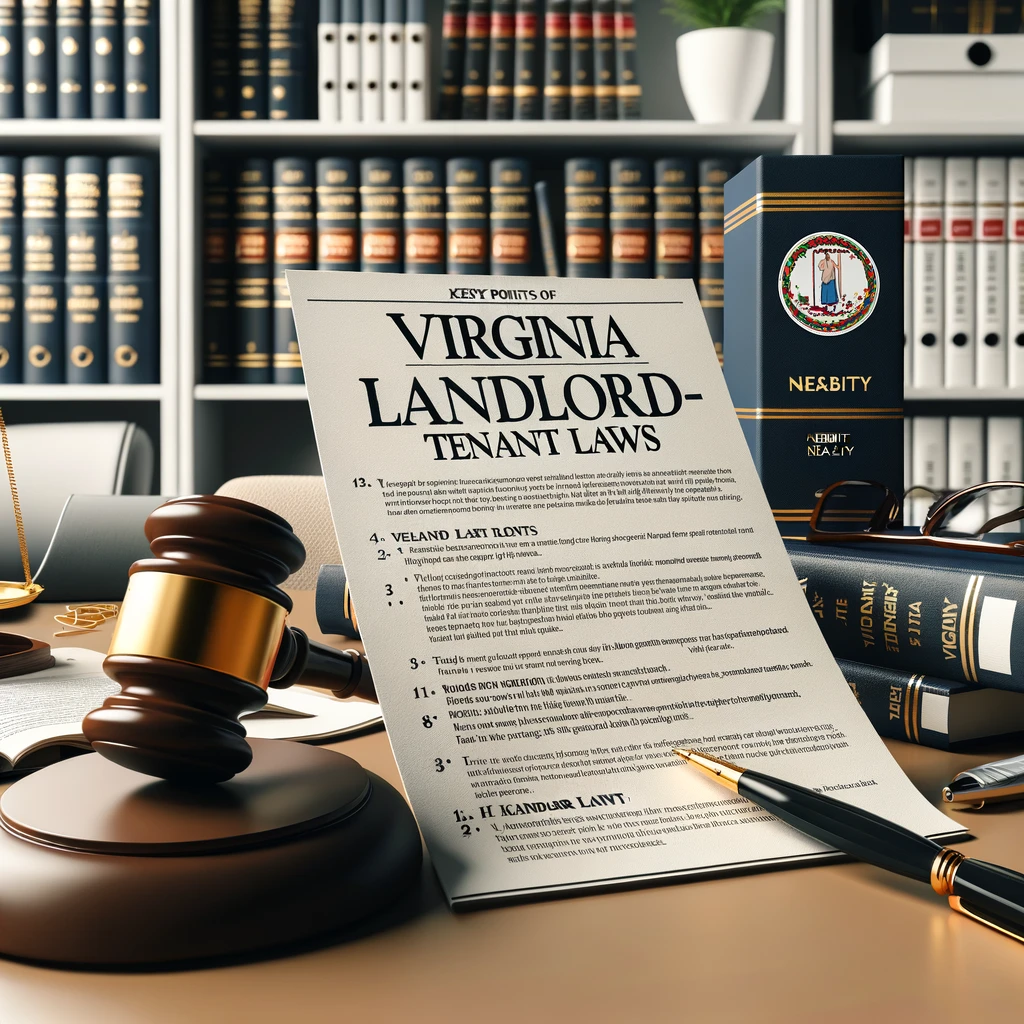
Navigating the complexities of landlord-tenant laws can be daunting, especially in a state like Virginia, where regulations are comprehensive and specific. At Nesbitt Realty, we understand the importance of being well-versed in these laws to protect both landlords and tenants. This article will provide a clear overview of key aspects of Virginia landlord-tenant laws, ensuring you’re informed and prepared for property management in the Commonwealth. Let’s dive into it, with a sprinkle of humor and some illustrative scenarios.
Lease Agreements: The Foundation of the Relationship
Think of a lease agreement as the prenuptial agreement of the landlord-tenant relationship. It sets the ground rules and expectations, preventing future disputes. Virginia law requires all lease agreements, whether written or verbal, to include certain essential elements:
- Names of the parties: Clearly identify both the landlord and the tenant. Imagine calling your tenant "Hey, you!" all year.
- Description of the rental property: Include the address and a description of the premises. "That nice place with the blue door" won't cut it.
- Term of the lease: Specify the lease duration, whether it’s a fixed-term or month-to-month agreement. No one likes indefinite relationships.
- Rent amount and due dates: Clearly state the rent amount, due date, and payment method. Ambiguity is the enemy of a peaceful coexistence.
- Security deposit details: Outline the security deposit amount and conditions for its return. Think of it as the rental world's version of an insurance policy.
Security Deposits: Know the Limits
Virginia law places specific limits on security deposits:
- Maximum amount: The security deposit cannot exceed two months’ rent. We know, your property is priceless, but there are limits.
- Return timeline: Landlords must return the security deposit within 45 days after the lease ends, minus any deductions for damages or unpaid rent. Tick-tock, the clock is ticking.
- Itemized list of deductions: If any deductions are made, the landlord must provide an itemized list of damages and costs. "Because I felt like it" isn't a valid deduction reason.
Entry Rights: Balancing Access and Privacy
Imagine showing up at a friend’s house unannounced and rummaging through their fridge. Awkward, right? The same goes for rental properties. Virginia law strikes a balance between a landlord’s need to access the property and the tenant’s right to privacy:
- Notice requirement: Landlords must provide at least 24 hours’ notice before entering the rental unit, unless it’s an emergency. No one likes surprise visits.
- Permissible reasons: Entry is allowed for repairs, inspections, showing the property to prospective tenants or buyers, or in cases of emergency. "Just because I was in the neighborhood" isn’t a valid reason.
Repairs and Maintenance: Ensuring Habitability
Landlords are required to maintain the rental property in a habitable condition. Picture this: Tenant Tim's ceiling starts leaking right above his bed. Not ideal.
- Basic utilities: Ensure the property has functioning plumbing, heating, and electrical systems. No one should have to bathe in ice water.
- Structural integrity: Keep the structure of the property safe and secure. No one wants to live in a Jenga tower.
- Timely repairs: Address any necessary repairs promptly to prevent further damage or health hazards. Tenant Tom shouldn’t need an umbrella indoors.
Tenants also have responsibilities, such as maintaining cleanliness and reporting repair needs in a timely manner. If a landlord fails to make necessary repairs, tenants have the right to take certain actions, such as withholding rent or making the repairs themselves and deducting the cost from the rent. But let's avoid DIY plumbing disasters, shall we?
Evictions: Following Legal Procedures
Evictions in Virginia must follow a strict legal process to protect the rights of both parties. It’s not as simple as saying, "You’re out!"
- Notice requirements: Before filing for eviction, landlords must provide written notice. The type of notice depends on the reason for eviction:
- Non-payment of rent: A 5-day notice to pay rent or vacate.
- Lease violations: A 21-day notice to correct the violation or vacate.
- No cause: For month-to-month tenancies, a 30-day notice is required to terminate the lease.
- Court proceedings: If the tenant does not comply with the notice, the landlord must file an unlawful detainer action in court and obtain a judgment for possession.
Tenant Rights: Understanding Protections
Virginia provides several protections for tenants to ensure fair treatment. Because nobody likes being treated unfairly.
- Right to a safe and habitable home: Landlords must meet health and safety standards. It’s the law, not just good manners.
- Protection from retaliation: Landlords cannot retaliate against tenants for exercising their legal rights, such as reporting code violations or joining a tenant union.
- Fair housing: Discrimination based on race, color, national origin, religion, sex, familial status, or disability is prohibited. Equality isn’t optional.
Conclusion
Understanding and adhering to Virginia’s landlord-tenant laws is crucial for maintaining a positive and lawful rental experience. At Nesbitt Realty, we are committed to helping both landlords and tenants navigate these regulations with ease and confidence. By staying informed and compliant, you can ensure a smooth and harmonious rental relationship.

For more detailed guidance or assistance with property management, contact Nesbitt Realty today. Our expertise in Virginia’s landlord-tenant laws will help you manage your properties effectively and legally.
 Navigating the complexities of landlord-tenant laws can be daunting, especially in a state like Virginia, where regulations are comprehensive and specific. At Nesbitt Realty, we understand the importance of being well-versed in these laws to protect both landlords and tenants. This article will provide a clear overview of key aspects of Virginia landlord-tenant laws, ensuring you’re informed and prepared for property management in the Commonwealth. Let’s dive into it, with a sprinkle of humor and some illustrative scenarios.
Navigating the complexities of landlord-tenant laws can be daunting, especially in a state like Virginia, where regulations are comprehensive and specific. At Nesbitt Realty, we understand the importance of being well-versed in these laws to protect both landlords and tenants. This article will provide a clear overview of key aspects of Virginia landlord-tenant laws, ensuring you’re informed and prepared for property management in the Commonwealth. Let’s dive into it, with a sprinkle of humor and some illustrative scenarios.
 For more detailed guidance or assistance with property management, contact Nesbitt Realty today. Our expertise in Virginia’s landlord-tenant laws will help you manage your properties effectively and legally.
For more detailed guidance or assistance with property management, contact Nesbitt Realty today. Our expertise in Virginia’s landlord-tenant laws will help you manage your properties effectively and legally. 